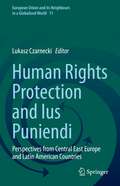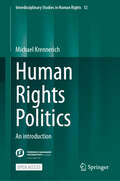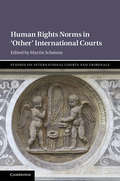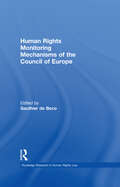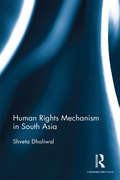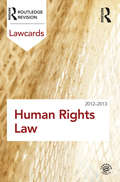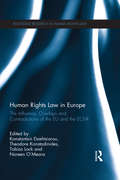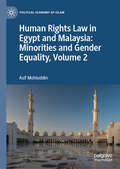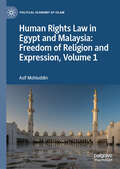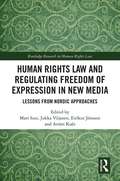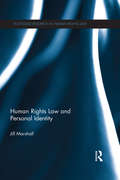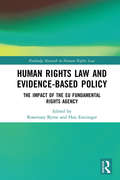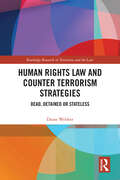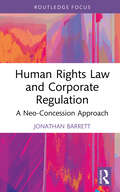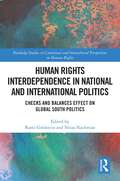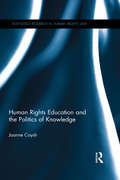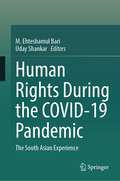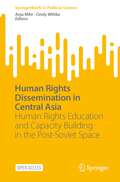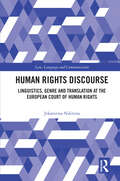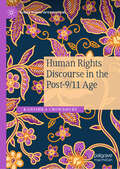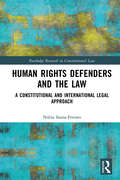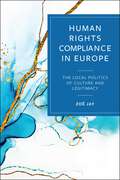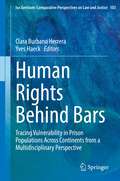- Table View
- List View
Human Rights Protection and Ius Puniendi: Perspectives from Central East Europe and Latin American Countries (European Union and its Neighbours in a Globalized World #11)
by Lukasz CzarneckiThis book examines human rights and penitentiary law in Central Eastern European and Latin American countries from a comparative perspective. How are penitentiary systems and human rights currently being transformed in both regions? This question guides contributors hailing from both Central Eastern Europe and Latin America, filling the gaps at both the international and national level. The book compares Central Eastern European countries with Latin American countries, shedding new light on similarities and differences alike.The main themes of this book are the analysis of penitentiary systems in different countries and a general analysis of criminal and criminological issues. The respective chapters examine how penitentiary laws are changing within different contexts and regulatory regimes. The book seeks to cross boundaries to understand new divisions, fragmentations, and forms of authoritarianism in today’s world, more specifically in Poland, North Macedonia, Chile, Argentina, Peru and Mexico.
Human Rights Politics: An introduction (Interdisciplinary Studies in Human Rights #12)
by Michael KrennerichThe book offers a comprehensive and clear introduction for students and those interested in human rights, written by a renowned human rights expert. It not only provides an introduction to the diversity of issues, actors and institutions in human rights policy and politics, but also offers assistance and suggestions on how the complex reality of human rights politics can be described and analysed with the help of political science and related disciplines. It deals with civil society engagement in human rights as well as state obligations and international efforts to protect human rights.This is an open access book.
Human Rights Obligations of Business
by Surya Deva David BilchitzIn recent years, the UN Human Rights Council has approved the 'Respect, Protect, and Remedy' Framework and endorsed the Guiding Principles on Business and Human Rights. These developments have been welcomed widely, but do they adequately address the challenges concerning the human rights obligations of business? This volume of essays engages critically with these important developments. The chapters revolve around four key issues: the process and methodology adopted in arriving at these documents; the source and justification of corporate human rights obligations; the nature and extent of such obligations; and the implementation and enforcement thereof. In addition to highlighting several critical deficits in these documents, the contributing authors also outline a vision for the twenty-first century in which companies have obligations to society that go beyond the responsibility to respect human rights.
Human Rights Norms in ‘Other' International Courts (Studies on International Courts and Tribunals)
by Martin ScheininThis unique book examines the role and impact of human rights norms in international courts other than human rights courts. It covers a whole range of courts and jurisdictions, looking at the practice of prominent international courts, such as the International Court of Justice and the International Criminal Court, as well as various fora of economic adjudication, including the World Trade Organisation, regional integration organisations in Europe and Africa, and investment arbitration. The book systematically explores the role of human rights norms at the International Tribunal for the Law of the Sea, thereby providing an insight into the future evolution of environmental law towards judicial enforcement at the international level. Within each jurisdiction under study, the respective authors, who all are experts within their fields, address the role of different categories of human rights, as well as the range of available modes of operation of human rights norms.
Human Rights Monitoring Mechanisms of the Council of Europe (Routledge Research in Human Rights Law)
by Gauthier De BecoThe book studies the human rights monitoring mechanisms of the Council of Europe. It provides an in-depth examination of six such mechanisms: the Commissioner for Human Rights, the European Committee for the Prevention of Torture and Inhuman or Degrading Treatment or Punishment (the CPT), the European Committee of Social Rights (the ECSR), the Advisory Committee on the Framework Convention for the Protection of National Minorities (the ACFC), the European Commission against Racism and Intolerance (ECRI) and the Committee of Experts of the European Charter for Regional or Minority Languages (the CECL). The human rights monitoring mechanisms of the Council of Europe seek to establish a permanent dialogue with governments to encourage them to better implement human rights treaties. They function principally through the use of national reports, on which basis they make recommendations, and may also visit or question states directly. The book looks at each mechanism in turn, discussing their composition, functions and working methods, as well as their relationship with other actors. It includes both a general discussion of the role of European human rights monitoring mechanisms as well as a comparative analysis of these mechanisms. The book aims to provide a clear understanding of the underlying approach of European human rights monitoring mechanisms and the challenges faced by them in terms of effectiveness. It will be useful for practitioners and students alike, especially those following courses in human rights or related fields.
Human Rights Mechanism in South Asia
by Shveta DhaliwalShveta Dhaliwal teaches at the Rajiv Gandhi National University of Law, Punjab, Patiala, India. Her areas of specialisation are geopolitics, regional human rights systems, comparative political thought and international relations. She has published more than 40 research papers and presented over 150 papers in international and national conferences. She has an authored and three edited books to her credit. She is member of the Indian Political Science Association and the Indian Society of International Law and South Asian Foundation.
Human Rights Lawcards 2012-2013 (Lawcards)
by RoutledgeRoutledge Lawcards are your complete, pocket-sized guides to key examinable areas of the undergraduate law curriculum and the CPE/GDL. Their concise text, user-friendly layout and compact format make them an ideal revision aid. Helping you to identify, understand and commit to memory the salient points of each area of the law, shouldn’t you make Routledge Lawcards your essential revision companions? Fully updated and revised with all the most important recent legal developments, Routledge Lawcards are packed with features: Revision checklists help you to consolidate the key issues within each topic Colour coded highlighting really makes cases and legislation stand out Full tables of cases and legislation make for easy reference Boxed case notes pick out the cases that are most likely to come up in exams Diagrams and flowcharts clarify and condense complex and important topics '...an excellent starting point for any enthusiastic reviser. The books are concise and get right down to the nitty-gritty of each topic.' - Lex Magazine Routledge Lawcards are supported by a Companion Website offering: Flashcard glossaries allowing you to test your understanding of key terms and definitions Multiple Choice Questions to test and consolidate your revision of each chapter Advice and tips to help you better plan your revision and prepare for your exams Titles in the Series: Commercial Law; Company Law; Constitutional Law; Contract Law; Criminal Law; Employment Law; English Legal System; European Union Law; Evidence; Equity and Trusts; Family Law; Human Rights; Intellectual Property Law; Jurisprudence; Land Law; Tort Law
Human Rights Law in Europe: The Influence, Overlaps and Contradictions of the EU and the ECHR (Routledge Research in Human Rights Law)
by Kanstantsin Dzehtsiarou Theodore Konstadinides Tobias Lock Noreen O’MearaThis book provides analysis and critique of the dual protection of human rights in Europe by assessing the developing legal relationship between the Court of Justice of the European Union (CJEU) and the European Court of Human Rights (ECtHR). The book offers a comprehensive consideration of the institutional framework, adjudicatory approaches, and the protection of material rights within the law of the European Union and the European Convention on Human Rights (ECHR). It particularly explores the involvement and participation of stakeholders in the functioning of the EU and the ECtHR, and asks how well the new legal model of ‘the EU under the ECtHR’ compares to current EU law, the ECHR and general international law. Including contributions from leading scholars in the field, each chapter sets out specific case-studies that illustrate the tensions and synergies emergent from the EU-ECHR relationship. In so doing, the book highlights the overlap and dialectic between Europe’s two primary international courts. The book will be of great interest to students and researchers of European Law and Human Rights.
Human Rights Law in Egypt and Malaysia: Minorities and Gender Equality, Volume 2 (Political Economy of Islam)
by Asif MohiuddinIn Muslim-majority countries, safeguarding minority rights and advancing gender equality are vital components of the broader human rights discussion. Minority rights encompass various groups, including ethnic, religious, and linguistic minorities, who often face discrimination, marginalisation and unequal treatment within society. These challenges are rooted in historical, cultural and socio-political factors that shape legal frameworks and societal attitudes towards minority communities. Similarly, gender dynamics play a significant role in the human rights discourse in these nations, as women encounter various forms of discrimination and inequality, such as limited access to education, employment, and participation in decision-making processes. This volume explores the legal frameworks concerning minority rights and gender equality in Egypt and Malaysia, shedding light on the challenges faced by marginalised groups in these countries. It evaluates the effectiveness of legal instruments and mechanisms in addressing discrimination and promoting inclusivity within these societies. Furthermore, it examines laws, government policies and court rulings related to women’s rights, covering essential topics such as education, employment and political engagement. This volume offers valuable insights for policymakers, legal practitioners, academics and activists dedicated to understanding and advocating for human rights in these societies.
Human Rights Law in Egypt and Malaysia: Freedom of Religion and Expression, Volume 1 (Political Economy of Islam)
by Asif MohiuddinThe discourse surrounding freedom of religion and expression in Muslim-majority countries is complex and multifaceted, shaped by a myriad of factors including cultural, political, and legal dynamics. This volume examines the complex interplay of these factors within the contexts of Egypt and Malaysia, offering valuable insights into the challenges and advancements in safeguarding these fundamental freedoms. From the diverse interpretations of Islamic principles to the varying legal frameworks and the influence of global events, such as geopolitical conflicts and terrorism, on human rights dynamics, this volume provides a comprehensive exploration of the complexities involved. Moreover, it delves into the historical, social, and political contexts that shape the protection and limitation of these freedoms, offering a nuanced understanding of the evolving discourse surrounding human rights in Muslim-majority countries. Through comparative analyses and discussions on the role of civil society and advocacy groups, this volume serves as an invaluable resource for scholars, policymakers, and activists seeking to deepen their understanding of the multifaceted realm of freedom of religion and expression in Egypt and Malaysia.
Human Rights Law and Regulating Freedom of Expression in New Media: Lessons from Nordic Approaches (Routledge Research in Human Rights Law)
by Mart Susi Jukka Viljanen Eiríkur Jónsson Artūrs KučsThe Nordic countries are well known globally for their high human rights standards and, at the same time, high degree of internet freedom. This edited collection reveals how the Nordic countries have succeeded in the task of protecting freedom of expression in the new media. It contains an overview of public policy choices and best practices of domestic online companies, which have the aspiration of finding global acceptance. Reviewing the topic of freedom of expression in new media within Nordic and Baltic countries, this book incorporates both general themes and interesting country-specific themes that will provide wider knowledge on the development of freedom of expression and media law in the online media era. A comprehensive analysis of regulation of online media, both at the level of legislation and application of law in courts and other authorities, are included. This book will contribute to the ongoing discussion as to whether there is a need to modify prevailing interpretation of freedom of expression. Human Rights Law and Regulating Freedom of Expression in New Media focuses on the multi-layered and complicated relationship between internet and human rights law. It contributes to the ongoing discussion regarding the protection of freedom of expression on the internet in the context of various doctrines of constitutional law, including the proliferation of constitutional adjudication. It will be of interest to researchers, academics, policymakers, and students in the fields of human rights law, internet law, political science, sociology, cultural studies, media and communications studies and technology.
Human Rights Law and Personal Identity: Human Rights Law And Personal Identity (Routledge Research in Human Rights Law)
by Jill MarshallThis book explores the role human rights law plays in the formation, and protection, of our personal identities. Drawing from a range of disciplines, Jill Marshall examines how human rights law includes and excludes specific types of identity, which feed into moral norms of human freedom and human dignity and their translation into legal rights. The book takes on a three part structure. Part I traces the definition of identity, and follows the evolution of, and protects, a right to personal identity and personality within human rights law. It specifically examines the development of a right to personal identity as property, the inter-subjective nature of identity, and the intercession of power and inequality. Part II evaluates past and contemporary attempts to describe the core of personal identity, including theories concerning the soul, the rational mind, and the growing influence of neuroscience and genetics in explaining what it means to be human. It also explores the inter-relation and conflict between universal principles and culturally specific rights. Part III focuses on issues and case law that can be interpreted as allowing self-determination. Marshall argues that while in an age of individual identity, people are increasingly obliged to live in conformed ways, pushing out identities that do not fit with what is acceptable. Drawing on feminist theory, the book concludes by arguing how human rights law would be better interpreted as a force to enable respect for human dignity and freedom, interpreted as empowerment and self-determination whilst acknowledging our inter-subjective identities. In drawing on socio-legal, philosophical, biological and feminist outlooks, this book is truly interdisciplinary, and will be of great interest and use to scholars and students of human rights law, legal and social theory, gender and cultural studies.
Human Rights Law and Evidence-Based Policy: The Role of the EU Fundamental Rights Agency (Routledge Research in Human Rights Law)
by Han Entzinger Rosemary ByrneThe EU Fundamental Rights Agency (FRA) was established to provide evidence-based policy advice to EU institutions and Member States. By blending social science research with traditional normative work, it aims to influence human rights policy processes through new ways of framing empirical realities. The contributors to this volume critically examine the experience of the Agency in its first decade, exploring FRA’s historical, political and legal foundations and its evolving record across major strands of EU fundamental rights. Central themes arising from these chapters include consideration of how the Agency manages the tension between a mandate to advise and the more traditional approach of human rights bodies to ‘monitor’, and how its research impacts the delicate equilibrium between these two contesting roles. FRA's experience as the first ‘embedded’ human rights agency is also highlighted, suggesting a role for alternative and less oppositional orientations for human rights research. While authors observe the benefits of the technocratic approach to human rights research that is a hallmark of FRA’s evidence-based policy advice, they also note its constraints. FRA’s policy work requires a continued awareness of political realities in Brussels, Member States, and civil society. Consequently, the complex process of determining the Agency’s research agenda reflects the strategic priorities of key actors. This is an important factor in the Agency’s role in the EU human rights landscape. This pioneering position of the Agency should invite reflection on new forms of institutionalized human rights research for the future.
Human Rights Law and Counter Terrorism Strategies: Dead, Detained or Stateless (Routledge Research in Terrorism and the Law)
by Diane WebberIn 2006, the United Nations urged Member States to ensure that counter terrorism policies guaranteed respect for human rights and the rule of law. This book demonstrates that, in many cases, counter terrorism policies relating to preventive detention, targeted killing and measures relating to returning foreign terrorist fighters have failed to respect human rights, and this encourages vulnerable people to be drawn towards supporting or committing acts of terrorism. Furthermore, in recent years, jurisprudence and public opinion in some countries have shifted from being at one stage more protective of human rights, to an acquiescence that some particularly draconian counter terrorism methods are necessary and acceptable. This book analyzes why this has happened, with a focus on the United States, United Kingdom, and Israel, and offers suggestions to address this issue. The work will be essential reading for students, academics and policy-makers working in the areas of human rights, humanitarian law, and counter terrorism.
Human Rights Law and Corporate Regulation: A Neo-Concession Approach (Routledge Research in Human Rights Law)
by Jonathan BarrettThis book argues for an intensely humanist engagement with the company and presents a model of company regulation that is compatible with the protection, respect for and fulfilment of human rights.Dr Barrett provides a theoretical framing for corporate regulation in the context of human rights States. He argues that States which have ratified the fundamental human rights instruments should, on principle, exclude bodies corporate from the human rights ecosystem, except to the degree necessary to respect property rights of humans and human rights in business. He therefore develops a ‘neo-concession’ account of the corporation as the basis for a model of corporate regulation to protect human rights. The book outlines and recommends the principal features of a company under a neo-concession model, and the role of regulators in furthering the State’s human right obligations. It also delves into the potential issues of technological developments, including decentralised autonomous organisations, and the lessons policymakers can gain from First Nations’ approaches to business.This is a thought-provoking volume that will appeal to scholars in the disciplines of human rights law and corporate governance, as well as policymakers and regulators interested in regulating business for greater societal good.
Human Rights Interdependence in National and International Politics: Checks and Balances Effect on Global South Politics (Routledge Studies in Contextual and Intercultural Perspectives on Human Rights)
by Rami GoldsteinThis book offers a fresh approach to human rights by analyzing the role of institutional checks and balances, governmentalism and system's approach, intended for the prevention of human rights violations, the enforcement of human rights norms and rules, and important actors such as International Non-Governmental Organizations (INGO), and domestic Non-Governmental Organizations (NGOs).The book presents case studies that offer innovative, political, historical, and social perspectives on how the International Human Rights Regime (IHRG) is practiced. It critically examines the interpretation, inconsistency, and application of the human rights norms in the Global South, and shows how the national mobilization of human rights is directly affected by the interdependence existing between the national and the transnational levels.This book will be of key interest to scholars, students, and practitioners of human rights, and more broadly of comparative politics, international law, global governance, international and nongovernmental organizations.
Human Rights Education and the Politics of Knowledge (Routledge Research in Human Rights Law)
by Joanne CoyshAround the world there are a myriad of NGOs using human rights education (HRE) as a tool of community empowerment with the firm belief that it will help people improve their lives. One way of understanding these processes is that they translate universal human rights speak using messages and symbols which make them relevant to people’s daily lives and culturally resonant. However, an alternative more radical perspective is that these processes should engage individuals in modes of critical inquiry into the ways that that existing power structures maintain the status quo and control not only how we understand and speak about social inequality and injustice, but also act on it. This book is a critical inquiry into the production, distribution and consumption of HRE and how the discourse is constructed historically, socially and politically through global institutions and local NGO practice. The book begins with the premise that HRE is composed of theories of human rights and education, both of which are complex and multifaceted. However, the book demonstrates how over time a dominant discourse of HRE, constructed by the United Nations institutional framework, has come to prominence and the ways it is reproduced and reinforced through the practice of intermediary NGOs engaged in HRE activities with community groups. Drawing on socio-legal scholarship it offers a new theoretical and political framework for addressing how human rights, pedagogy, knowledge and power can be analysed between the global and local by connecting the critical, but well-trodden, theories of human rights to insights on critical pedagogy. It uses critical discourse analysis and ethnographic research to investigate the practice of NGOs engaged in HRE using contextual evidence and findings from fieldwork with NGOs and communities in Tanzania.
Human Rights During the COVID-19 Pandemic: The South Asian Experience
by M. Ehteshamul Bari Uday ShankarThis book sheds light on the fact that the proclamation of an emergency can be a legitimate constitutional method to take prompt preventative measures in protecting the interests of the society in times of grave crises. However, the exercise of emergency powers should not undermine a nation’s commitment to democratic values, such as maintaining the rule of law and upholding fundamental human rights. The COVID-19 pandemic has posed grave threats to the lives and health of individuals. However, since the constitutions of South Asian nations do not permit the proclamation of an emergency on health grounds, executives of these nations were constrained to rely, among other things, on ordinary legislation to tide over the threats posed by the pandemic. Although these statutes entrust the executive with extensive emergency powers, they do not simultaneously stipulate any safeguards subjecting the exercise of such powers to a reliable system of checks and balances. Accordingly, this book critically examines the exercise of emergency powers in the South Asian nations to tide over threats posed by the COVID-19 pandemic, which had a profoundly adverse impact on the human rights of individuals. Such exercise of powers was consistent with the general tendency demonstrated by succeeding generations of the executives in these nations to use emergency situations as the convenient means for imposing long-lasting limitations on the rights of individuals. Consequently, this book identifies the flaws, deficiencies, and lacunae of the legal framework in these nations, which permit the executive to assume unfettered power in the exercise of emergency measures at the expense of the liberty of individuals. Consequently, based on these findings, recommendations will be put forward for initiating reforms in these nations aimed at ensuring the maintenance of a delicate balance between the necessity to respond tograve threats and to simultaneously prevent undue intrusion on the fundamental human rights of individuals.
Human Rights Dissemination in Central Asia: Human Rights Education and Capacity Building in the Post-Soviet Space (SpringerBriefs in Political Science)
by Anja Mihr Cindy WittkeThis open access book explores the field of human rights dissemination in Central Asia. Offering a comparative perspective on five post-Soviet Central Asian states—Kazakhstan, Kyrgyzstan, Uzbekistan, Turkmenistan, and Tajikistan, it examines compliance with international human rights standards in these countries. The contributions capture various aspects of human rights dissemination through educational programs, seminars, training, and empowerment programs at Central Asian universities, together with Central Asian NGOs/CSOs and international organizations. The book shows that a change of behavior among state and non-state actors in the region can only happen when both local and international actors, usually international donors, jointly take action to report, train, and empower people in human rights. This book is an invitation to anyone interested in the (troubled) nexus between international human rights norms and standards and their implementation on the local level, as well as in the effective empowerment of citizen in the region.
Human Rights Discourse: Linguistics, Genre and Translation at the European Court of Human Rights (Law, Language and Communication)
by Jekaterina NikitinaThis book explores the concept of human rights as constructed in language, shedding light on discursive and professional practices at the European Court of Human Rights (ECtHR), as differentiated from other judicial institutions offering human rights defence mechanisms. It unveils the system of genres at the ECtHR adopting a holistic outlook, which caters for an interdisciplinary readership including both language and law professionals. The genres, along with the underlying professional practices and interdiscursive mechanisms, are described following the lifecycle of cases, starting from the initial application to the Court and ending with institutional press releases and execution of judgments, which foster greater democratic participation. The Court is depicted through its plurality of voices and stakeholders, acknowledging the non-monolithic nature of judicial discourse. The work follows the knowledge migration path from national into international justice and traces how national, and linguistically divergent, elements are recontextualized in a supranational context. It problematizes the coexistence of institutional and outsourced legal translation as well as their potential effects on the discourse of human rights. The book covers issues of legal terminology, phraseology, dialogism, pragmatics and knowledge dissemination dynamics. The study will be an invaluable resource for academics, researchers and translators working in the areas of law and language, linguistics, Translation Studies and Genre Studies.
Human Rights Discourse in the Post-9/11 Age (Human Rights Interventions)
by Kanishka ChowdhuryThis book offers a materialist critique of mainstream human rights discourse in the period following 9/11, examining literary works, critical histories, international declarations, government statutes, NGO manifestos, and a documentary film. The author points out some of the contradictions that emerge in contemporary rights language when material relations are not sufficiently perceived or acknowledged, and he directs attention to the role of some rights talk in maintaining and managing the accelerated global project of capital accumulation. Even as rights discourse points to injustices—for example, injustices related to labor, gender, the citizen’s relationship to the state, or the movement of refugees—it can simultaneously maintain systems of oppression. By constructing subjects who are aligned to the interests of capital, by emphasizing individual “empowerment,” and/or by containing social disenchantment, it reinforces the process of wealth accumulation, supports neoliberal ideologies, and diminishes the possibility of real transformation through collective struggle.
Human Rights Defenders and the Law: A Constitutional and International Legal Approach (Routledge Research in Constitutional Law)
by Núria Saura-FreixesThis book presents a comprehensive examination of the Declaration on Human Rights Defenders and provides an analysis of the level of its reflection in regional human rights systems. The work explores the development of the role of the individual in human rights protection since the 1998 United Nations Declaration on Human Rights Defenders. It locates the nature, activities and need for protection of human rights defenders within the current international legal framework and outlines the place and scope for a specific right to promote and protect human rights. It traces the origins of the right and the main international instruments that define it, both at national and international level. Finally, it considers the impact that the right to defend human rights can have on constitutional and international law. The book will be a valuable resource for academics and researchers working in the areas of International Human Rights Law and Constitutional Law.
Human Rights Controversies: The Impact of Legal Form
by Luke McNamaraMany countries confront similar human rights controversies, but, despite the claimed universality of human rights values they are not always resolved in the same way. Why? What role do local legal conditions play? Is human rights discourse more potent where rights are constitutionally entrenched, rather than where there is a tradition of respect for underlying human rights values but no bill of rights? Comparative socio-legal examination of three recent controversies - double jeopardy reform, recognition of same-sex relationships and the operation of hate speech laws - in four countries - Australia, Canada, New Zealand and the United Kingdom provides answers to these questions. Examination of these controversies suggests that differences in the design of domestic legal institutions and procedures for the injection of human rights values into legal decision-making processes can have a powerful effect on the manner in which human rights issues are constructed, handled and resolved.
Human Rights Compliance in Europe: The Local Politics of Culture and Legitimacy
by Zoë JayThe European Court of Human Rights depends on the good faith cooperation of its members to implement judgement and maintain legitimacy, but how this translates into compliance varies both across and within states. This book presents an innovative framework for understanding how local cultures dynamically shape states’ ideas about what is and is not legitimate in international human rights regimes. The book investigates compliance as a product of cultural politics. Case studies from the United Kingdom, Germany, and Croatia reveal how states rely on local understanding of human rights and law to deal not only with compliance ‘sticking points’ but also to evaluate the legitimacy of the European human rights system as a whole.
Human Rights Behind Bars: Tracing Vulnerability in Prison Populations Across Continents from a Multidisciplinary Perspective (Ius Gentium: Comparative Perspectives on Law and Justice #103)
by Yves Haeck Clara Burbano HerreraThis book brings together leading authorities from the fields of international human rights law, criminology, legal medicine, and political science with international human rights judges and UN experts to analyze the current situation of detainees in Europe, the Americas and Africa.This comprehensive volume offers a platform for reflecting on the complexity of the prison problem from a multidisciplinary perspective. The authors address detention-related issues with the aim of generating new ideas that contribute to both academic discussion and critical analysis. Academic dialogue across the globe provides insights into various national and international carceral systems and how they deal with human rights behind bars. At the same time, the critical comparison helps to identify basic needs and practices that can work in multiple settings. The contributors are respected experts and leading scholars in their fields, and each has pursued prison and human rights research over the last decades. However, this is the first time that they have come together in a multidisciplinary academic project. This book aims to stimulate diverse actors to imagine alternative ways of engaging with persons deprived of their liberty, in academia and in practice.
